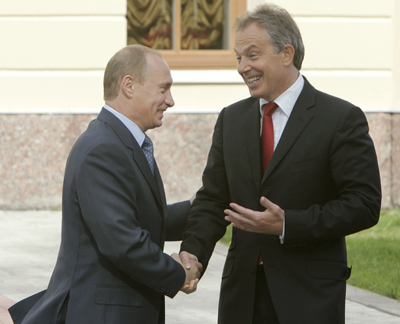Israeli warplanes began striking Lebanon after Hezbollah guerrillas captured
two Israeli soldiers Wednesday in a cross-border raid into Israel. The bombings
continued into Sunday, as Hezbollah fired barrages of rockets ever deeper into
Israel.

Russian President Vladimir
Putin (L) greets British Prime Minister Tony Blair upon his arrival at the G8
Summit session in St. Petersburg July 16, 2006. [Reuters]
The death toll rose above 100 in Lebanon, and stood at 15 in Israel.
Bush described the escalation of violence as "a moment of clarification" that
should show the world how Hezbollah is disrupting the peace process.
"It is a moment that requires all of us to work together and send a clear
message, not only to Hezbollah, but to the Iranians who financed Hezbollah and
to the Syrians who house Hezbollah," Bush said.
But as they began their meeting, Bush and Chirac tried to present a united
front.
Referring to his relationship with Bush, Chirac said he was pleased that "our
approach to problems is relatively similar."
Bush thanked Chirac for France's leadership in helping pass
U.N. Security Council resolution 1559 last year, which demands that Syria
withdraw from Lebanon and that militias there disarm -- a reference to
Hezbollah. Hezbollah has refused to disarm as demanded by the resolution, saying
it is a resistance movement.
Bush said he was confident that other leaders would look to the spirit of the
resolution as they deal with the cause of the problems in the Middle East --
which he identified as Hezbollah and its connections to Iran and Syria.
Chirac said he and Bush agreed that U.N. resolutions had to be applied, and
that "all forces which threaten and endanger the security, stability and
sovereignty of Lebanon must be stopped."
Bush's national security adviser, Stephen Hadley, said the U.S. was pressing
for a summit statement identifying Hezbollah as the main culprit and emphasizing
the importance of maintaining a democratic Lebanon.
Italian Premier Romano Prodi expressed caution on a joint statement.
"We are still in the phase where we are exposing our positions, not in a
negotiating phase," he said.
The Israel-Lebanon crisis and the nuclear ambitions of Iran and North Korea
moved to the top of the agenda for the first G-8 summit to be held in Russia.
"We, the Russian side, regret ... that on the eve of the G-8 ... we see an
escalation of the situation in the Middle East," Russian President Vladimir
Putin, the summit host, said at a midnight news conference.
Putin had molded this year's G-8 summit to showcase his country's
re-emergence on the world stage after a devastating economic collapse in 1998,
hoping to focus on energy security, the fight against infectious diseases and
education.
However, he failed to win a much-anticipated agreement with the U.S. on
Russia's admission to the
World Trade Organization, the 149-nation group that sets the rules for world
trade. The United States is the only country that has not signed off on Russia's
membership in the WTO, and Bush dashed Putin's hopes for getting in now.
Japanese Prime Minister Junichiro Koizumi met with Putin ahead of the summit
and asked for Moscow's support on the North Korea issue.
But Putin offered a lukewarm reply, saying that while he understood Japan's
position, he hoped the U.N. Security Council would be able to work out the
proper response, according to Japanese delegation officials who briefed
reporters on condition of anonymity.